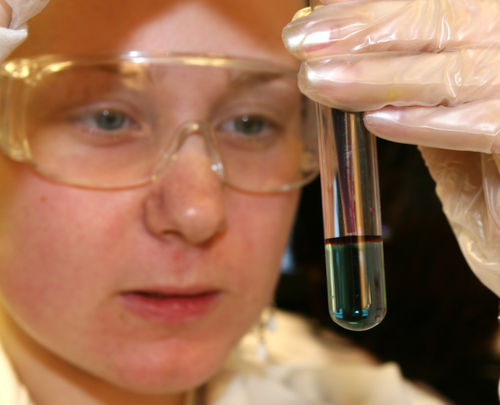|
Chemical Engineering
Polytetraflouroethane. This was once mentioned in the Guinness Book of World Records as the most slippery substance in the world. This was accidentally discovered by a young researcher working in the DuPont research facility in New Jersey in the US in 1938. This had extensive use in the World War, during man's conquest of the lunar territory and this continues to enjoy the trust of millions of housewives across the world even today. We better know this compound as "Teflon", the way Du Pont named this polymer in 1945. Where is it used in an average household - in the non-stick coating of a non-stick pan? Polytetraflouroethane has the lowest coefficient of friction among solids because of weak intermolecular forces. Now we are sure that you understand the practical application of what you learn in your school text books!!
 |
Given above is an example of the application of Chemical Engineering and its immense scope. Simply put, Chemical Engineering deals with the application of the sciences of Physics, Chemistry and Mathematics into altering the "chemistry" of substances using innovative processes, thereby developing superior materials for highly specialized applications. The high performance materials that are developed using different chemical processes are used in biomedical, aerospace, environmental and military applications. At a more commercial level, the employment opportunities for Chemical Engineers exist in industries like Paints, Fertilizers, Medicines, Refineries etc.
|
The legendary Chief Executive Officers of Intel (Andy Grove), GE (Jack Welch), Exxon Mobil (Lee Raymond) etc are just some of the industry stalwarts who studied and practiced chemical engineering during their careers. Linus Pauling, Guilio Natta, Mario Molina are some exceptionally talented people who practiced the discipline in some form and won Nobel Prizes for their efforts.
Chemical Engineers who are involved in the design and maintenance of chemical industries are called process engineers. They have the responsibility of planning and managing the entire production chain for optimizing costs.
Some of the subjects that a student of Chemical Engineering will study in detail during his four year B.Tech course are
- Chemical Process Technology, Particle Technology, Chemical Separations, Process Control , Industrial Waste Management etc. The emphasis on "Clean Technology" is on the increase in many curriculums. Clean technology refers to the use of processes that will not disturb the environment
- ideally these are non-polluting processes. For example, the heat generated from the Cathode Ray Tube in a computer can be used as an input energy source for a process. The sensitivity on environment is also on the rise. Pollution is a heavily debated topic in the industry. Automobile companies are moving towards cleaner fuels
- biodiesel for example. Compulsion to use cleaner fuels is forcing compliance. Where in North-India would you find a fleet of special type of battery operated three wheeler supplied by BHEL ? Near the Taj Mahal. Because the automobile exhaust can chemically act on the marble structure, there is a restriction to vehicles near the historical monument. Applications are plenty for Cleaner Technology and Cleaner Processes.
|

